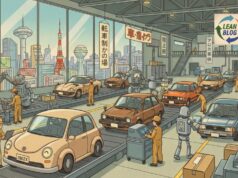Desperate to Cut Costs, Ford Gets Union's Help – WSJ.com
Here's an example of why you can never be satisfied. A key to Toyota's success is the mindset that you're always shooting for perfection (an article with some examples). Here's a story about Ford:
Ford acknowledges it rested on its laurels as the profits from its popular sport-utility vehicles and pickups masked underlying problems in its manufacturing systems. By 2000, GM and Chrysler began to gain on Ford. Last year, the Harbour Report estimated that Ford was two hours slower than GM and Chrysler, and also had slipped to six or seven hours behind the Japanese companies.
“No question, we let others pass us on these things. We took our eye off the ball and got intoxicated with just making trucks,” said Chris Bolen, a Ford director of manufacturing who started out as a Lima line worker. “Internally we ignored a lot of waste….We let manufacturing get in trouble, and now we've painted ourselves into a corner where without radical changes we could go out of business.”
Ouch, that's a very candid assessment, coming from Ford. Let's hope the company can pull out of it's downward spiral.
If you’re working to build a culture where people feel safe to speak up, solve problems, and improve every day, I’d be glad to help. Let’s talk about how to strengthen Psychological Safety and Continuous Improvement in your organization.









One thing I run into is the attitudes from primarily sales & marketing, that seem to have a more difficult time accepting the concept of finding problems, always improving, and so forth. they want to believe the product is perfect, that cycle times and costs can be reduced because they think so (without considering the hard work that needs to be done), that quality can be assumed, etc. In manufacturing we are evolving towards the Lean approach. In sales and marketing, the leadership and attitudes are so far away from this approach it is causing problems as we try to move the company forward. Is this happening elsewhere? What’s others experience in bridging this gap?